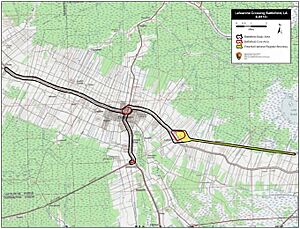Battle of LaFourche Crossing facts for kids
Quick facts for kids Battle of LaFourche Crossing |
|||||||
|---|---|---|---|---|---|---|---|
| Part of American Civil War | |||||||
|
|||||||
| Belligerents | |||||||
| Commanders and leaders | |||||||
| Albert Stickney | James P. Major | ||||||
| Units involved | |||||||
| 23rd Connecticut Infantry 176th New York Infantry 26th Massachusetts Infantry 42nd Massachusetts 26th Maine Infantry Regiments Captain Blober's Cavalry 21st Indiana Heavy Artillery 25th New York Light Artillery |
District of Western Louisiana | ||||||
| Strength | |||||||
| 838 | 1 Cavalry Brigade | ||||||
| Casualties and losses | |||||||
| 48 | 219 | ||||||
The Battle of LaFourche Crossing was a fight during the American Civil War. It happened on June 20–21, 1863, in Lafourche Parish, Louisiana. This battle was part of a larger plan by the Confederates called Taylor's Operations in West Louisiana. The Union forces won this battle.
Why the Battle Happened
The Confederate side wanted to stop the Union from getting supplies. Their leader, Major General Richard Taylor, sent a group led by Colonel James P. Major. This group's goal was to cut off Union supply lines. They also wanted to make the Union troops leave Brashear City and Port Hudson.
Major's soldiers started their journey from Washington, Louisiana. As they marched, they attacked Union forces and boats. They also raided plantations. During these raids, they captured animals and supplies. They also took back people who had recently gained their freedom.
The Battle Begins
Brigadier General William H. Emory was in charge of the Union defenses in New Orleans. He put Lieutenant Colonel Albert Stickney in command at Brashear City. Stickney's job was to stop the Confederate attack.
Emory told Stickney that Major's troops were heading towards LaFourche Crossing. He ordered Stickney to send soldiers there. Stickney felt Brashear City was safe. So, he personally led troops to LaFourche Crossing. They arrived on the morning of June 20. Later that afternoon, Stickney's scouts reported that the enemy was coming fast.
Confederate soldiers started pushing back Stickney's guards around 5:00 p.m. Southern cavalry then moved forward but were forced back. After the Union troops fired some shots, the Confederates pulled back. They headed towards Thibodaux.
Fighting Continues
In the late afternoon of June 21, the Confederates attacked the Union guards again. The fighting lasted for more than an hour. Then, the Confederates retreated once more. Around 6:30 p.m., the Confederates returned with more force. They started an artillery duel, which is when cannons fire at each other.
At 7:00 p.m., the Confederates charged the Union lines. About an hour later, the Confederates stopped fighting. They pulled back towards Thibodaux again. The Union forces remained in control of the battlefield. Even though they lost this battle, Major's raiders kept going towards Brashear City.
 | Chris Smalls |
 | Fred Hampton |
 | Ralph Abernathy |


